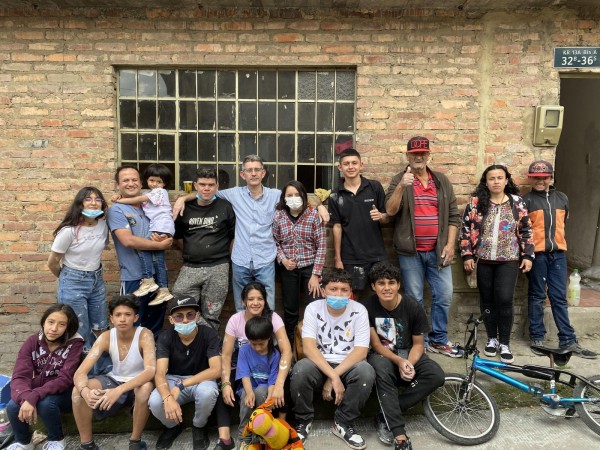
Members of a youth group from La Resurrección Parish in Bogotá (Colombia),
after helping paint the house of a vulnerable family of their neighborhood during Holy Week, 2022.
after helping paint the house of a vulnerable family of their neighborhood during Holy Week, 2022.
The Beatitudes are one of the most beautiful pages of the Gospel. Brother Roger Schutz, founder of the ecumenical community of Taizé, in France, said that—together with the Our Father—we should consider them as the fundamental text of the Christian life. And we have two versions of the Beatitudes: those by Matthew (Mt 5:1-12), which are perhaps better known (the first that come to mind), and those by Luke (Lk 6:20- 26). We would like to focus on the latter, and on the differences with the Beatitudes of Matthew, and on the message that is hidden precisely in these differences.
To begin with, in Luke Jesus does not announce the Beatitudes from a mountain, as it happens in Matthew, but on a plain. This geographical location is significant: while Matthew wants to underline that the Master speaks from on high (the removed place where one arrives to meet God), in Luke Jesus pronounces the Beatitudes on the valley, the space where people live.
In Matthew, the first beatitude reads: «Blessed are the poor in spirit.» On the other hand, in Luke it will be «Blessed are the poor»: just the poor, the material poor. A few verses further down, Matthew will say that blessed are «those who hunger and thirst for righteousness.» Luke’s second beatitude will simply be «Blessed are the hungry.» Not those who hunger for righteousness, but those who hunger for bread.
Somehow, while Matthew underlines Jesus’ invitation to be people who have chosen to live simply and in austerity, who have become poor as a result of a personal decision, and who have a deep inner desire for justice in the world, Luke’s message is more social, less spiritual: blessed are the poor and the hungry, because God is on their side.
Both versions of the Beatitudes are important. Matthew’s, emphasizing interiority and our ultimate options, those we cultivate when we seek spaces of solitude and find God on the mountains of peace— and Luke’s version, emphasizing our social commitment, the one we assume in the valleys of the world, confronted with the reality of the material poverty suffered by so many (material poverty which is scandalous in a world where we could all live comfortably if wealth were not so poorly distributed).
In Luke the message is, with all clarity and energy, that God takes the side of the victims of this world: happy will be the poor, the hungry, those who cry, because they are God’s beloved.
And this implies, of course, a question: What about us? Do we always side with the victims, the oppressed and the humiliated, or, perhaps, in order not to create problems for ourselves, are we among those who remain silent in the face of injustice, or do we even join the group of those who only seek their own good?
In this same social line, the Beatitudes of Luke have something that those of Matthew do not have: they are accompanied by some warnings. «Woe to you!» To whom are these warnings addressed? To the rich, those who are satiated, those who laugh, those of whom everyone speaks well.
And what's wrong with laughing, or being satiated, or being talked about well? These are the attitudes that describe people who are complacent with their environment, who agree the state of the world as it is, and who therefore live carefree. Woe to those, in short, who adapt too much to their environment! And that is a very serious warning: in this world of ours, so pierced by injustice, feeling too comfortable (perhaps because things are already going well for me) is an act of evident selfishness.
One looks around and sees so much injustice, so much oppression, so many people working so hard for so little, and others working so little for so much, and so much abuse, so much violence, so much cruelty, so much indifference—that it is logical to conclude that no one should ever say, «Everything is great!» A Christian is a person who is aware that the world is not great, and therefore does not uncritically accommodate himself to it: on the contrary, he protests and works to build a more just society.
Let us make the Beatitudes our own: those of Matthew, more spiritual, that invite us to examine our ultimate, intimate choices about the kind of person we want to be. And Luke’s, more social, that encourage us to develop a greater social commitment with the poor and those who suffer.









